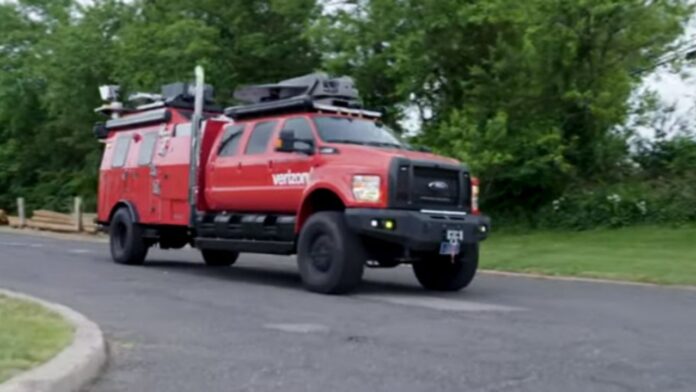Nearly two decades ago, four Montana river raft guides saw an opportunity to make a difference. And in an old dirt-floored barn with a leaky roof, they built their first communications trailer. That spirit of service and determination still guides Nomad GCS today.
The company designs and manufactures cutting-edge, connected mobile operations centers for defense, public safety, energy, healthcare, and private sector business clients. It also offers MESH networks and procurement services.
Mobile Command Centers
Mobile command centers (or MCCs) are vehicles or trailers that are outfitted with state-of-the-art technology and communication systems, allowing security personnel and first responders to coordinate their efforts on the ground. Whether they’re working in an urban area, rugged landscape, or disaster-stricken region, MCCs enable a quick and adaptable response to any situation.
Ultimately, a command center’s main purpose is to provide effective communication during a critical incident or disaster event. This is the key to ensuring that all other outcomes of an incident are positively affected. However, many modern command centers have been adapted to include many features that go well beyond communications. While some of these added capabilities are beneficial, it’s important to remember that the primary reason for a command vehicle to be deployed in the first place is to quickly establish communications on the ground.
MCCs can be equipped with satellite and wireless networks, enabling seamless connectivity between on-site teams and headquarters. This real-time exchange of information improves situational awareness, facilitates resource allocation, and promotes effective decision-making.
These nimble and versatile mobile operations centers are often used in remote areas to deliver healthcare services and support emergency responses. They’re also vital to the safety and well-being of a community during natural disasters, wildfires, flooding, droughts, and other catastrophic events.
While the primary function of an MCC is to enhance coordination between on-site teams and headquarters, it can also serve as a portable office and housing space for sensitive equipment. This means that officers can take all the equipment they need with them to an operational site without having to transport it through dangerous and congested areas. Additionally, an MCC can be outfitted with state-of-the-art equipment to test potential evidence from a crime scene on the spot.
Whether you’re looking for an MCC or just want to upgrade your current communication system, Nomad GCS is here to help. Our team has the experience and the expertise to provide a complete solution for your operational needs, leveraging advanced technology and the latest innovations. Contact us today to discuss your requirements or schedule a consultation in our Montana factory.
Tactical Vehicles
The military’s tactical wheeled vehicles (TWV) support many missions, including resupply, maintenance, and engineer support. They are used to transport soldiers and materials like munitions, water, and fuel. They also serve as weapons platforms for combat operations. The Army is working to modernize its TWV fleet, with plans to issue a new strategy in 2022. However, the Army’s ongoing initiatives, such as research into ion batteries to electrify its TWV fleet, may impact that strategy.
The military’s new Joint Light Tactical Vehicle (JLTV) is replacing the obsolete Humvees in the field. The JLTV is designed to be mechanically reliable and easy to maintain. It can handle rough terrain and is prewired to connect to current and future tactical communication and data networks.
GM Defense has made an impact in the TWV market with a new company called GM Defense that is built to translate technical and manufacturing advancements from the commercial automotive side of GM into military vehicles for the Army and other customers. GM’s first major win, the Infantry Squad Vehicle program, has put the company squarely back in the defense business. The company’s new production facility, which stands up a vehicle in just over 90 days, shows that it can move quickly to meet demand for future TWVs.
Tactical trucks are the foundation of the military’s supply chain, and they must be safe, reliable, and capable in a wide variety of environments. Oshkosh’s family of military-off-the-shelf (MOTS) vehicles offer a variety of solutions for tactical fleets, from cargo transport and shelter carrier to resupply, equipment movement, and weapon systems platform. Their robust engineering and scalable manufacturing capabilities enable them to adapt the truck’s design to each mission’s specific needs.
Nomad GCS provides mobile command centers and communications trailers to the government, public safety, private sector, and telecommunications industries. The Flathead Valley company has offices in Columbia Falls and Libby and employs nearly 200 people. Nomad offers a range of services, including mobile command centers, IT integration, MESH networks, software development, EMI/RF shielding, emergency response, and more.
Communication Trailers
The Nomad team solves the toughest problems for their customers through the design and construction of cutting-edge, connected mobile operations centers. Founded in 2002 by four friends and rafting guides, Will and Seth Schmautz, Shane Ackerly, and Clay Binford, the company was built on an unflinching focus on customer success and a roll-up-the-sleeves, Montana work ethic. Today, Nomad has grown to more than 200 employees who build specialty vehicles and trailers for clients in all 50 states and internationally.
When every minute matters, public safety, and other emergency response crews cannot afford to call tech support if their equipment doesn’t work. They need rugged, reliable equipment that’s proven to withstand harsh field conditions and the test of time. For Nomad GCS, that means integrating Cisco technology in their communications trailers.
From their headquarters near Glacier National Park in Montana, Nomad designs and builds large mobile command centers and go-anywhere tactical vehicles. They also offer a complete line of trailers that can be deployed and set up in the field to provide remote communication and command capability.
Whether in the heart of a forest fire or on a mountaintop, these trailers link dispersed assets together and to centralized data and command centers. They can be used for remote communication, telemedicine, surveillance, or a variety of other mission-critical needs.
The TCT-HD is Nomad’s jack-of-all-trades communications solution for agencies of all types and sizes. It packs 63 vibration-isolated rack units into an HVAC-controlled electronics shelter and includes integrated equipment storage. With a 10-day self-deployment and minimal user input after deployment, it’s the ultimate in modular comms horsepower.
A dynamic team of problem solvers and change-makers, Nomad customers in defense, public safety, energy, healthcare, education, and private sector business rely on us to keep them connected when everything is on the line. From engineering, fabrication, and IT to finance, operations, and more, Nomad teams deliver daily.
IT Integration
The team at Nomad GCS engineers, fabricates, and builds all its vehicles on-site to ensure every project meets the highest standards. They also have an in-house IT team of certified Cisco Network Systems Engineers who work hand-in-hand with Design, Mechanical, and Electrical engineers throughout each project. This unique approach to design allows them to build optimal connectivity capabilities from the ground up.
In a public safety environment, where every minute matters, it’s critical that emergency responders have the best technology available. That’s why Nomad GCS chose to equip its trailers with Cisco equipment. It’s the most reliable and rugged communications system on the market, backed by industry-leading 24/7 support. With a NeverDown network, Nomad trailers provide first responders with real-time data, reducing the need to travel for information and increasing productivity. It also reduces costs by providing administrators with the information they need for billing, regulatory compliance, and more.
Whether it’s for an emergency response situation, ongoing fieldwork, or utility monitoring, the TCT-HD is the ultimate mobile communications solution. This heavy-duty powerhouse features a dual axle chassis and more rack space than its smaller TCT sibling to accommodate larger equipment loads and more mission-critical connectivity. The TCT-HD is a flexible platform that can be configured to your specific needs.
For example, one utility customer uses its eight TCT-HDs to connect field crews in remote locations to centralized data and command centers. They’re often staged on mountaintops to link dispersed assets and are deployed as backups during disaster response incidents. They also serve as a communications platform for ongoing projects and remote construction sites in areas where communication infrastructure has been compromised.
The Nomad expansion into Libby is good news for the Lincoln County economy. The county is the state’s largest wood products producer and home to its most commercial forestland. Its primary industries include forestry and logging, mining, and manufacturing, and unemployment rates are lower than Flathead County’s at 2.2% and 4.2%, respectively, as of 2021. Nomad’s new facility is a former welding factory and is 500 feet by 200 feet, giving it ample room to outfit its mobile operations solutions for customers.




























